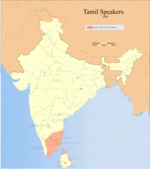Our website is made possible by displaying online advertisements to our visitors.
Please consider supporting us by disabling your ad blocker.
Tamil culture
This article has multiple issues. Please help improve it or discuss these issues on the talk page. (Learn how and when to remove these messages)
|
| Part of a series on |
| Tamils |
|---|
 |
|
|
Tamil culture refers to the culture of the Tamil people. The Tamils speak the Tamil language, one of the oldest languages in India with more than two thousand years of written history.
Archaeological evidence from the Tamilakam region indicates a continuous history of human occupation for more than 3,800 years. Historically, the region was inhabited by Tamil-speaking Dravidian people. It was ruled by various kingdoms such as the Sangam period (3rd century BCE to 3rd century CE) triumvirate of the Cheras, Cholas and Pandyas, the Pallavas (3rd–9th century CE), and the later Vijayanagara Empire (14th–17th century CE). European colonization began in the 17th century CE, and continued for two centuries until the Indian Independence in 1947. Due to its long history, the culture has seen multiple influences over the years and have developed diversely.
The Tamils had outside contact in the form of diplomatic and trade relations with other kingdoms to the north and with the Romans since the Sangam era. The conquests of Tamil kings in the 10th century CE resulted in Tamil culture spreading to South and Southeast Asia. Tamils form the majority in the South Indian state of Tamil Nadu and a significant portion of northern Sri Lanka. Tamils have migrated world-wide since the 19th century CE and a significant population exists in Sri Lanka, South Africa, Mauritius, Fiji, as well as other regions such as the Southeast Asia, Middle East, Caribbean and parts of the Western World.
Previous Page Next Page


